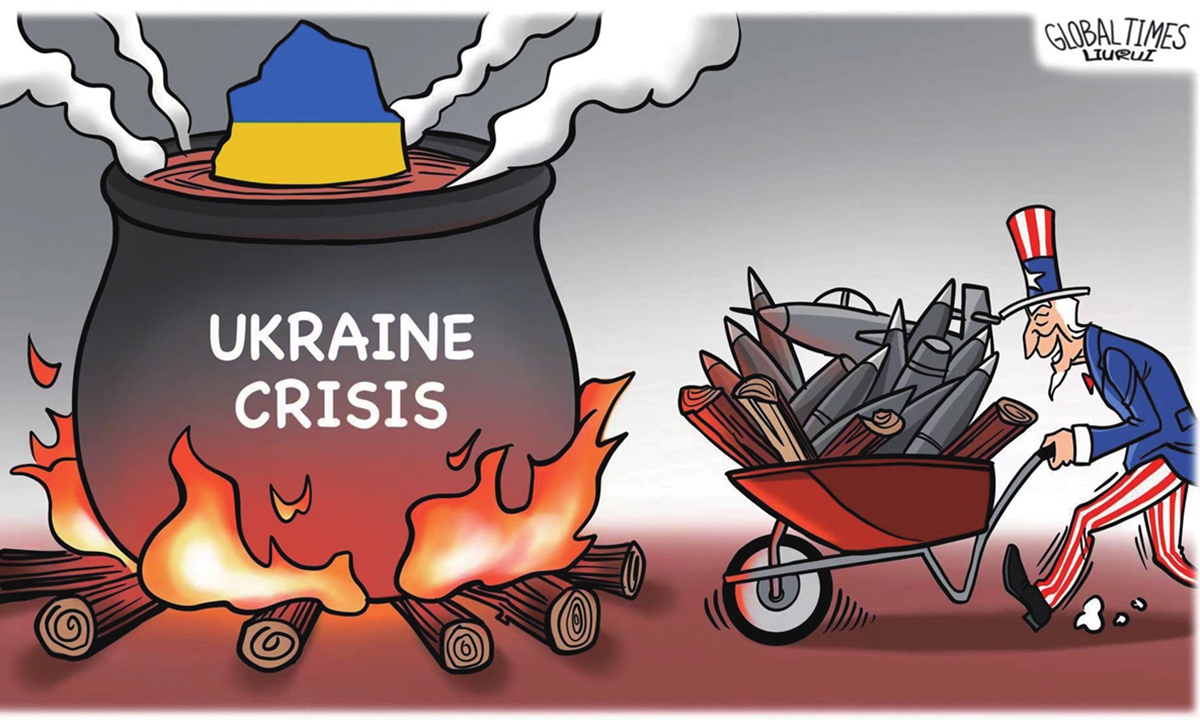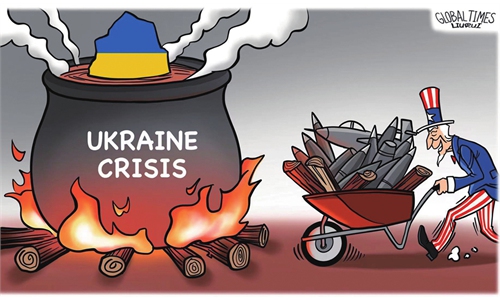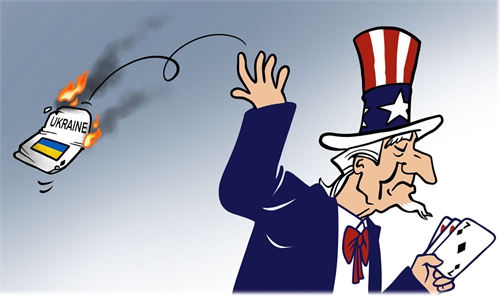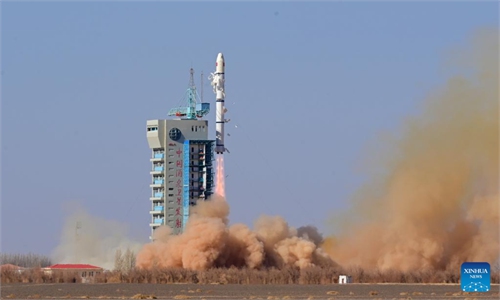Time will prove the enormous value of China’s position paper: Global Times editorial

US Ukraine crisis Illustration: Liu Rui/GT
On the one-year anniversary of the Russia-Ukraine conflict, China issued a position paper titled "China's Position on the Political Settlement of the Ukraine Crisis," systematically elaborating on China's stance in 12 points. As a responsible major country, although China is not a party to the Ukraine crisis, it is always willing to play a constructive role in promoting a resolution to it. What this document shows is China's sincerity and goodwill in actively promoting peace talks.
At present, the Russia-Ukraine conflict is still in a stalemate, and it is difficult to see the possibility of it easing in the short term. However, no one can afford a long-term war of attrition, and its spillover effects have aroused widespread vigilance in the international community. The impact of this crisis on the vast number of developing countries that urgently need to achieve their development goals is especially direct and strong. It is precisely because of this that these countries are unwilling to be forced to choose sides in the conflict, but eagerly hope that all parties can find a rational and peaceful solution. In this context, the significance and value of the document issued by China on Friday is even more prominent.
Since the outbreak of the Ukraine crisis, China has always stuck to doing what is right and followed the course of objectivity and justice. President Xi Jinping has put forward four principles, called for joint efforts in four areas, and shared three observations on Ukraine, playing a responsible and constructive role in easing the situation and resolving the crisis and outlining China's fundamental approach to the issue. This document covers 12 areas: respecting the sovereignty of all countries, abandoning the Cold War mentality, ceasing hostilities, resuming peace talks, resolving the humanitarian crisis, protecting civilians and prisoners of war, keeping nuclear power plants safe, reducing strategic risks, facilitating grain exports, stopping unilateral sanctions, keeping industrial and supply chains stable, and promoting post-conflict reconstruction. It not only reiterated China's consistent proposition, but also absorbed the reasonable concerns of all countries, reflecting the greatest common denominator of the international community on the Ukraine issue.
China's position on the Ukrainian issue is neutral but not passive, and is a stance that can be accurately described as "active neutrality." China's position paper reflects the demands of both Russia and Ukraine, and also addresses broader international issues such as nuclear war, food security, and global strategic stability. The paper is highly condensed and specific, with great relevance to the current situation. It fully recognizes the complexity and difficulty of the issue, and shows China's responsible attitude of not standing idly by, not fueling the fire, and opposing taking advantage of the situation.
There is an old Chinese saying: Sickness comes like a landslide, sickness goes like a thread being drawn. It is important to emphasize that we should not expect anyone to come up with a magic solution that will immediately solve the Ukraine crisis. No person, country, or international organization can achieve this. As stated in the position paper, complex problems do not have simple solutions. However, no matter how complex the problem is, we should not give up on dialogue and negotiation; no matter how sharp the dispute is, we should persist in seeking a political solution; and no matter how difficult the situation is, we should give peace a chance. The position paper released by China reflects the efforts to resolve disputes through dialogue and negotiation and build a regional security structure to achieve peace. This is not only possible but also feasible.
Of course, people also see that some in the US and the West do not seem to want the conflicting parties to return to the negotiating table, but are trying to further muddy the waters and pursue their own interests. Just before the first anniversary of the Russia-Ukraine conflict, the so-called "China responsibility" theory has emerged in various guises. For example, the US and NATO, which were the initiators of the conflict, have repeatedly and groundlessly claimed that China "may provide weapons to Russia" in order to pressure China. However, it is clear to everyone which side is constantly delivering heavy weapons to the battlefield, and there are even tragic incidents such as the Nord Stream pipeline being bombed to prevent both sides from returning to the negotiating table.
Currently, the US and the West are questioning and attacking China's friendly relations with Russia on the one hand, while on the other, they are asking China to use this relationship to play the role they expect in the Ukraine crisis. This is contradictory. Now that China has released its position paper, they cannot find a point of attack, so they start nitpicking and changing the topic. In the eyes of the US and the West, any solution that does not put pressure on Russia is not a good one. When they exert extreme pressure on Russia, normal contacts between other countries and Russia appear glaringly obvious. In fact, they cannot tolerate a neutral stance. In contrast, Russia and Ukraine, as the parties concerned, have a generally positive attitude toward China's position. This is very thought-provoking.
We believe that it is especially necessary for the political elites in the US and the West to carefully study the 12-point position paper by China. Although it is aimed at the current conflict between Russia and Ukraine, it can also serve as a reference for the turbulence and conflicts that occur elsewhere in the world, most of which are closely related to the foreign policies of the US and the West. How to prevent humanitarian tragedies from happening at the source and achieve lasting peace and universal security is what the world needs to consider most on the one-year anniversary of the Russia-Ukraine conflict. The position and views proposed by China will also endure over time and exhibit their shining historical value over the course of history.



